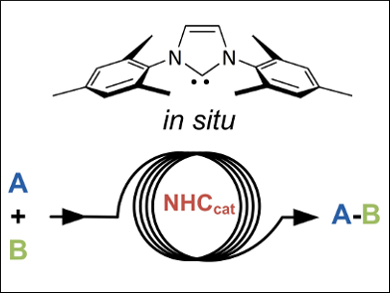N–heterocyclic carbenes (NHCs) are powerful tools with numerous applications, especially in organometallic chemistry. NHCs are electron–rich, neutral σ–donors and moderate π–acceptors, which makes them ideal ligands for metal complexation.
Moreover, the electronic properties of NHCs can be easily altered by changing the nature of the azole ring and/or its substituents. However, despite their synthetic versatility, NHCs are air and moisture sensitive. Hence, their handling and storage usually requires an inert atmosphere and costly equipment, such as a glove box.
Jean–Christophe M. Monbaliu and colleagues, University of Liège, Belgium, have designed a straightforward continuous-flow setup for the generation of free NHCs and their use as organocatalysts that offers advantages such as no need for the isolation of unstable NHCs, fast mixing, and a more efficient, reliable, and safer chemical process.
The generated NHCs were tested as catalysts in situ for the transesterification of vinyl acetate and benzyl alcohol as well as the amidation of glycine methyl ester with ethanolamine. Both reactions proceeded with full conversion and high yields, showcasing excellent examples of continuous–flow organocatalysis with NHCs.
- Continuous-Flow N-Heterocyclic Carbene Generation and Organocatalysis,
Lorenzo Di Marco, Morgan Hans, Lionel Delaude, Jean-Christophe M. Monbaliu,
Chem. Eur. J. 2016.
DOI: 10.1002/chem.201505135




